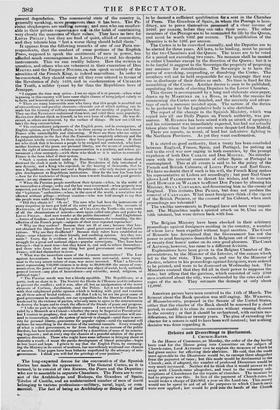The long-expected decree for the convocation of the Spanish Cortes
has made its appearance. The General Cortes, as it is termed:is to consist of two Estates, the Peers and the Deputies; who are to assemble in separate Chambers. The Peers are to con- sist of the Archbishops and Bishops, the Grandees of Spain, Titulos of Castile, and an undetermined number of men of merit belonging to various professions—military, naval, legal, or corn- snercial. The fact of being an Archbishop or Bishop is of itself
to be deemed a sufficient qualification for a seat in the Chamber of Peers. The Grandees of Spain, in whom the Peerage is here- ditary, are to prove themselves possessed of a clear income of 20001. per annum, before they can -take their seats. The other members of the Peerage are to be nominated for life by the Queen, and most be worth 6001. per annum. The qualification of the Deputies is to be 1201. per annum.
The Cortes is to he convoked annually, and the Deputies are to be elected for three years. All laws, to be binding, must be passed by the two Chambers and the Queen. The taxes are to be voted for a period not exceeding two years. No measure shall be mooted in either Chamber except by the direction of the Queen ; but it is to be lawful to suggest to the Sovereign-the propriety of proposing any measure for consideration. The Sovereign is to have the power of convoking, suspending, or dissolving the Cortes. The members will not be held responsible for any language they may use in discharge of their duties as such. No time is fixed for the assembling of the Cortes. Another decree is soon to be published, regulating the mode of electing Deputies to the Lower Chamber.
This decree is accompanied by a long and elaborate state paper, drawn up by MARTINEZ DE LA ROSA, in which the reasons for summoning the Cortes are detailed, and the necessity and advan- tage of such a measure insisted upon. The nature: of the duties to be performed by the Legislative body is also sketched.
The report of the change in the Spanish Ministry, which was copied into all our Daily Papers on French authority, was pre mature. M. B URGOS has been seized with an attack of apoplexy; and his retirement was immediately expected, but had not actually taken place when the last accounts were despatehed from Madrid.
There are reports, as usual, of hard but indecisive fighting in the Northern Provinces. As yet they want confirmation.






















 Previous page
Previous page